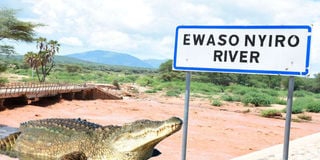Premium
Crocodile mauls and swallows boy, 13, in Isiolo

Hassan Jaldesa, 13, was killed and swallowed by a crocodile in River Ewaso Nyiro on December 12, 2024.
On Jamhuri Day, Hassan Jaldesa, 13, decided to take a break from his herding duties.
He dived into River Ewaso Nyiro to momentarily escape from the searing heat of Merti, Isiolo County.
But unknown to the young boy who sat his Kenya Primary School Education Assessment exam this year, the danger was lurking in the brown waters.
Less than five minutes in the waters, a giant crocodile swam towards him and grabbed him by the leg before administering a fatal bite and swallowed his body, whole.
It was an incident that irked residents of Bulesa village who armed themselves with all sorts of weapons, hunted down the killer reptile, tore open its belly and recovered some remains of the boy’s body which were interred on Friday in line with Muslim burial rites.
Mr Galgalo Malicha, a relative, said more than 100 youth assembled near the crocodile-infested river and attacked the first one but it turned out not the killer. They then targeted the next one which happened to be the culprit.
“The youths were armed with machetes and spears and managed to kill two of the reptiles on Friday morning. Efforts to track down the crocodile on Thursday were suspended after nightfall,” explained Mr Malicha.
Bulesa Location Chief Hassan Guyo confirmed the incident adding that three people sustained injuries with one currently admitted to the Isiolo County Hospital.
“One of the youths Ali Roba was hit by the beast’s tail and suffered a fractured rib and is recuperating in hospital. Two others sustained bites on their arms and were treated at a local health facility,” said Mr Guyo.
The chief added that Kenya Wildlife Service officers were informed about the incident and arrived at the scene on Friday morning when the hunt was on.
He disclosed that this was not the first such incident, noting that at least six people have been killed and several others injured by the reptiles while trying to cross the river to or from the neighbouring Garfarsa village.
Goats mauled
For the better part of this year, River Ewaso Nyiro has been flowing normally, providing a conducive environment for the crocodiles.
But this has come at a price to the locals, with dozens of goats and sheep having been mauled at the watering points.
Recalling the 1pm Thursday incident, Mr Malicha said the Grade Six pupil at Taqwa Primary School was herding goats with his cousin, aged six years.
“The young boy did not raise an alarm after his colleague was attacked and continued herding the goats in an isolated area. He only reported at around 6pm when he drove the animals home carrying the deceased’s shoes and clothes and told his parents that his cousin had been attacked by a ‘huge animal’ that was hiding in the river,” said Mr Malicha, an uncle to the deceased.
Mr Malicha termed the incident that led to the death of the young boy, the fourth born in a family of seven, as devastating and is now appealing to the government to speed up the compensation process for those who lose their lives or suffer injuries as a result of wildlife attack.
“Families whose members have been killed by crocodiles in the past within the locality are yet to be compensated. The government needs to prioritise payouts for victims of wildlife attacks since we cannot ask that the killer animals be moved from their natural habitat,” he said.
In April this year, President William Ruto announced that the government would pay Sh960 million to families affected by human-wildlife conflicts across the country.
He added that moving forward, unnecessary bureaucracy that hinders prompt compensation would be eliminated.
Around the same time, then Tourism Cabinet Secretary Alfred Mutua revealed that the government was banking on a new payout system to verify claims and payments to survivors and families of the victims of human-wildlife conflicts.
Compensation for one killed by wild animals is Sh5 million while cases of injuries resulting in permanent disability are compensated at Sh3 million.
Cases of human/wildlife conflicts are common in Samburu, Kajiado, Narok, Taita Taveta, Tana River and Laikipia counties among others.
Elephants, lions, hyenas, hippos, crocodiles, buffaloes and snakes top the list of wild animals that inflict fatal injuries on humans.





